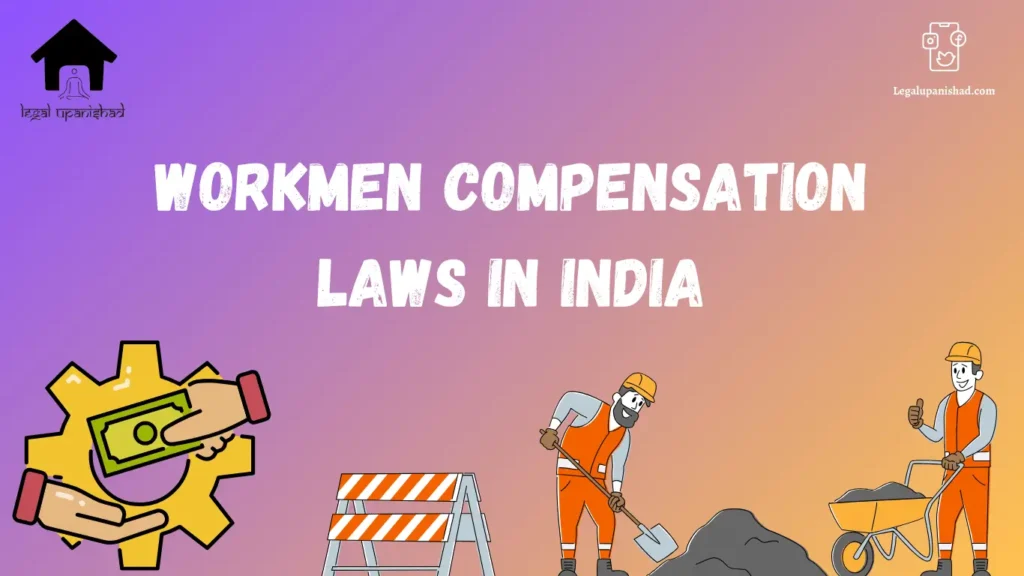

Workmen compensation regulations are critical to protecting the well-being of the labour force in India. These regulations are intended to safeguard workers suffering financial hardship as a result of work-related illnesses or diseases. While encouraging a happy relationship between employers and employees, the regulatory structure guarantees that employees receive proper salaries and medical benefits.
This article dives into the fundamentals of India’s workers’ compensation legislation, including developments, benefits, and issues. Workmen’s Compensation Laws in India, officially known as Employees’ Compensation Laws, are a series of laws meant to offer economic and medical assistance to employees who are injured or get occupational illnesses while at work. These laws seek to protect the working class’s well-being and social security by requiring companies to pay their employees or their dependents in the event of workplace incidents or fatalities.
The fundamental goal of these regulations is to shift the responsibility for occupational accidents or diseases from employees to employers. This implies that employees are entitled to reimbursement for injuries sustained without having to establish employer negligence, in accordance with the idea of ‘no-fault responsibility.’ The regulations encourage a fair and reasonable work environment by resolving compensation claims in a timely and efficient manner, avoiding the need for protracted and costly court battles.
The article looks into the full structure of India’s Workers Compensation Laws, illuminating its historical context, important sections, and relevance.
Workmen’s compensation rules in India date back to the late nineteenth century, when British colonial authorities enacted the Employers’ Liability Act of 1880. The purpose of this Act is to compensate workers for injuries experienced while on the job. Following that, additional labour-related laws were passed, resulting in the Indian Workmen’s Compensation Act of 1923 (renamed the Employees’ Compensation Act in 2010), and that is still the primary law controlling this subject today.
Workmen’s Compensation Laws in India consist of the following major aspects:
Workers’ compensation laws are critical for offering a layer of protection for employees and their loved ones, as well as ensuring that they do not encounter financial troubles as a result of workplace injuries or illnesses. These regulations contribute to a peaceful relationship between employers and workers and promote workplace safety, which helps both the workforce and the wider economy by offering benefits such as social security and legal protection.

Workmen’s compensation regulations in India provide various advantages and are critical for ensuring a fair and reasonable work environment.
Despite their importance, workers’ compensation laws confront several challenges:
The importance of these regulations lies in their capacity to offer prompt and adequate reimbursement to employees who suffer injuries while working or get occupational illnesses without requiring them to prove employer fault. By putting businesses on the hook for workplace accidents, these regulations encourage a feeling of accountability and responsibility throughout the corporate community, resulting in a safer work environment.
The advantages of workers’ compensation laws are numerous. During tough times, they provide social security to employees and their families, guaranteeing that health care and financial support are easily available. The notion of ‘no-fault responsibility’ streamlines the compensation procedure, permitting employees who are hurt to get assistance quickly without resorting to protracted legal fights. Nonetheless, there are issues that must be addressed. To safeguard a broader variety of employees, the reach of these regulations should be increased to embrace more industries and forms of employment.
Furthermore, ensuring prompt compensation payments and implementing severe penalties for noncompliance will improve the efficacy of these regulations even further.
Policymakers and stakeholders must work together consistently to achieve the intended impact. By collaborating, they can make well-informed choices regarding strengthening Workers’ Compensation Laws, improving employee welfare, promoting workplace safety, and protecting working-class rights. Finally, the evolution and execution of Workmen’s Compensation Laws in India demonstrate the country’s dedication to the well-being and dignity of its employees. By adhering to these rules, India may continue to progress towards a more inclusive and equal society in which the rights of workers and social security are safeguarded and respected.

Our Latest Articles
Divorce is rarely simple, however when huge resources, high-profile people, or complex relational intricacies are involved, the stakes are considerably higher. High-stakes divorce from cases require a degree of mastery and key reasoning that goes past the conventional. In Chennai, divorce from expert legal advisors is exceptional to deal with these difficult cases, guaranteeing that their clients’ advantages are safeguarded constantly. This is the way top divorce lawyers in Chennai explore the intricacies of high-stakes divorces. Far reaching Case Investigation The most vital phase in dealing with a high-stakes divorce is an exhaustive examination of the case. Divorce from expert… Read more : How Divorce Specialist Lawyers Handle High-Stakes Cases?
Article title: ‘PCI Hosting: A Cornerstone of Data Privacy Compliance’ Introduction The Payment Card Industry Data Security Standard (PCI DSS) is a crucial framework designed to protect sensitive cardholder data and ensure secure transactions. As data breaches become increasingly common, and global data privacy regulations such as GDPR, CCPA, and HIPAA tighten their grip, maintaining compliance with these standards has never been more vital. PCI hosting emerges as a pivotal solution, enabling organizations to align with these stringent regulations, safeguard customer data, and fortify their security posture. Understanding PCI DSS PCI DSS is a set of security standards created to… Read more : PCI Hosting: A Cornerstone of Data Privacy Compliance
Selecting the best criminal lawyer requires assessing a number of important factors. The choice of criminal defense attorney can make all the difference in how a case turns out. With the significant risks involved, having an informed and skilled lawyer at your side can really pay off. The right attorney from the list of criminal lawyers in bangalore will help their client navigate the complexities of the criminal justice system by recognizing legal nuances and offering strong defense tactics. Good Reputation and Professionalism A lawyer’s reputation and professionalism are crucial indicators of their reliability. Seek out an attorney known for… Read more : What To Look For In A Criminal Lawyer? Check Here
This article on ‘New Hit and Run Law in India: Understanding the Controversy and Protests’ was written by Tosani Lal, an intern at Legal Upanishad. I. INTRODUCTION Hit and run refers to the act of a driver causing an accident and fleeing the scene without providing assistance or identifying themselves.[1] The action is widely condemned due to its potentially severe consequences for victims and the lack of accountability it entails. Hit and run incidents often result in serious injuries or fatalities, leaving victims and their families devastated. The new hit and run law in India, implemented under the Bharatiya Nyaya Sanhita,… Read more : New Hit and Run Law in India: Understanding the Controversy and Protests
In this article, we will delve into the recent landmark ruling by the Supreme Court of India in the case of Association for Democratic Reforms v. Union of India.
May we help you?